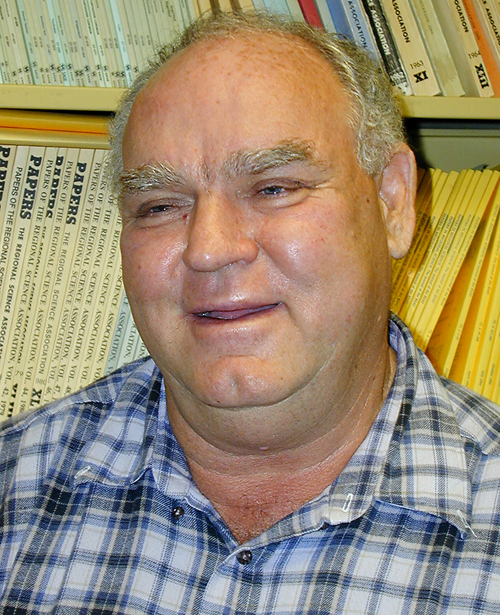The latest issue of the prestigious journal Nature includes an interview with Professor Reginald G. Golledge, conducted shortly before his death on May 29. The following is from Nature 459, 877 (10 June 2009) | 10.1038/nj7248-877a:
Careers Q&A: A new way: Before his death, late geographer Reginald Golledge discusses his work after sudden blindness.
Careers Q&A
Q&A
Virginia Gewin
Blinded in 1984, geographer Reginald Golledge was this year named Faculty Research Lecturer by the University of California, Santa Barbara.
How did you begin on your career path?
In the 1960s, I discovered that a theoretical and quantitative revolution was transforming the previously descriptive field of geography, so I decided to research how people acquire spatial knowledge.
How did sudden blindness affect your career?
I was completely lost. I had no idea how I was going to teach without access to notes, prepared lectures or overheads. Figuring out how to continue my research was even more difficult. One day, two psychologists — Jack Loomis and Roberta Klatzky, both then at the University of California, Santa Barbara (UCSB) — asked if they could help. Roberta suggested I find ways to build on my previous mental-map research. They agreed to meet with me weekly and we began 25 years of intense collaboration, which took my research in a new direction towards dissecting spatial cognition. In the process, I became more competent and was able to continue my academic life while helping other blind people around the world.
What is your greatest scientific achievement?
I pioneered a behavioural approach to human geography to study how humans find their way in the world. More than anything else, I think I opened the field’s eyes to the fact that the geography you carry in your mind, your mental map and the way you process spatial information, are just as important as recording the facts of human existence on the surface of Earth. In addition to an objective reality, there is also subjective reality — what is stored in your mind’s mental model of the world.
What has given you the most career satisfaction?
I’ve been developing a personal guidance system for blind travellers that allows them to be completely independent of guides or guide dogs. Our prototype got a great deal of recognition, and now companies in many countries are producing these guidance systems. They’re similar to vehicle-guidance systems, which use GPS and spatial databases or electronic maps.
Do you have any advice for disabled people who want to be scientists?
Disabled people can make long-term career plans, but it takes a strong commitment to their work.
What does this faculty award mean to you?
This is the best because it is given by your peers. It’s the highest honour that UCSB faculty can award. It is so nice to know that what I’ve been doing has not gone unnoticed.
What is your motto?
You don’t have to have sight to have vision.
Interview by Virginia Gewin. Reginald Golledge sadly died on 29 May.
(http://www.nature.com/naturejobs/2009/090611/full/nj7248-877a.html)
See the June 2 article, “A Giant of Geography Is Gone, But His Legacy Lives On” here



